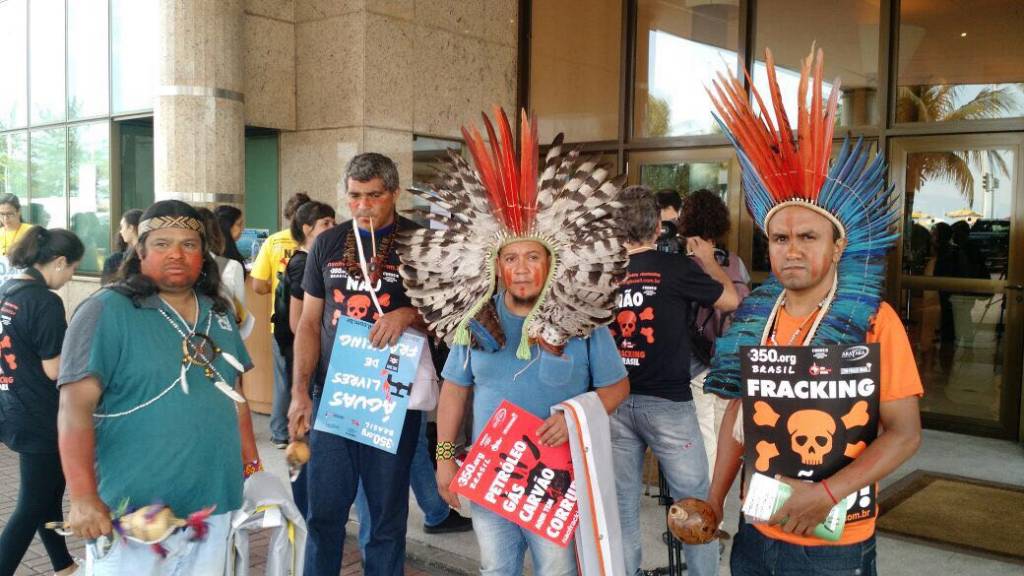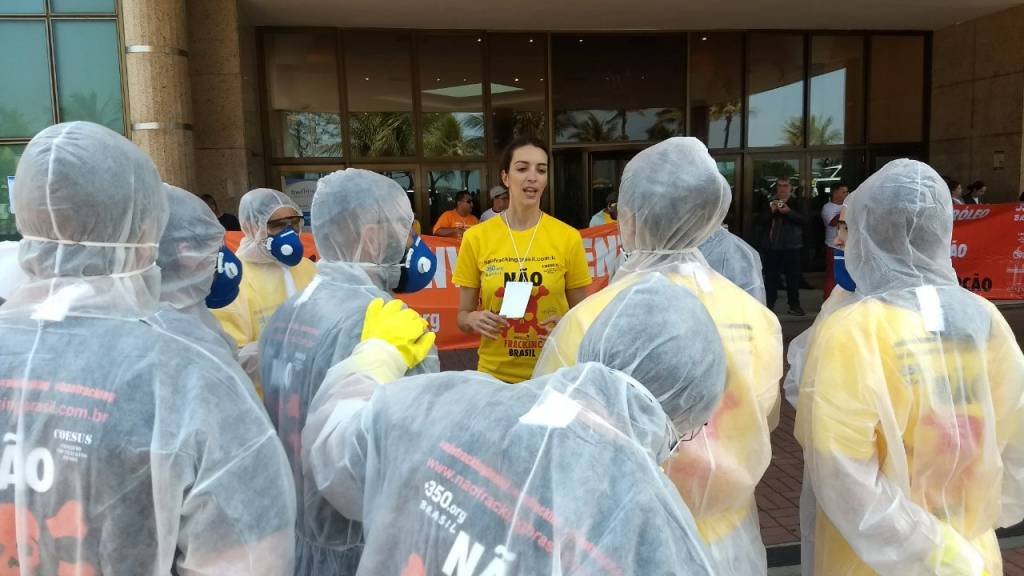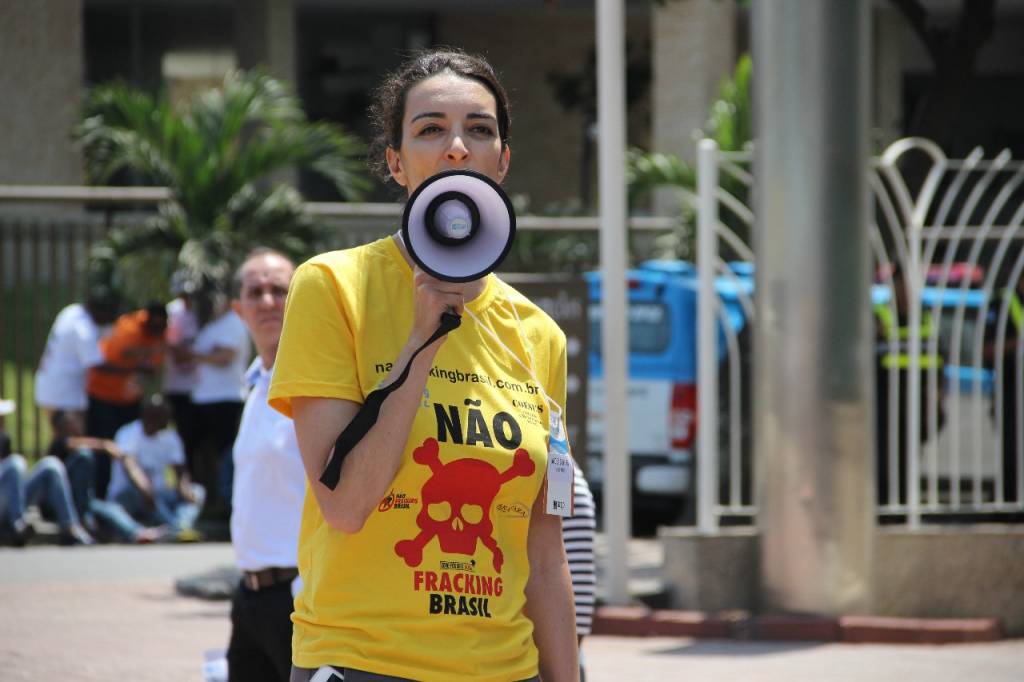
Indigenous leader Kretã Kaingang, together with other indigenous leaders, during the protest at the hotel Windsor Barra, in Rio de Janeiro, Brazil (Photos: Caroline Kwasnicki).
350.org Brasil’s action this Wednesday (September 27th) proved that emotional violence, physical force and political persecution will not silence the voice or hurt the honor of those who defend noble causes. After a peaceful demonstration organized along with COESUS (the Brazilian No Fracking Coalition for Climate, Water and Life) during the 14th Round of Bids for oil and gas exploration promoted by the Brazilian Oil and Gas Agency, indigenous and environmental activists were attacked by the auction’s security guards and continue to face threats even outside Rio de Janeiro.
Once again, Brazil has proved to be a dangerous country for those who defend environmental, climate and human rights causes. Demonstrators have been repeatedly threatened, endangering their own lives and their families, and increasing their sense of concern and vulnerability. For Nicole Figueiredo de Oliveira, Director of 350.org in Brazil and Latin America, this proves that this government, together with the extremely powerful and corrupt corporations, wants to silence social movements and criminalize them for the right to free expression.
“Our goals are technical, scientific, political and ideological because we advocate for a better, healthier and fairer world for everyone. We know that our demands bother groups with a lot of power and influence, which are often linked to corrupt governments. But demonstrations such as the one we did yesterday are legitimate and essential in any democratic society. Any form of repression takes away the possibility of claiming our rights,” she said.

Nicole Figueiredo de Oliveira, director of 350.org in Brazil and Latin America, during the action against the oil and gas auction.
The demonstration was held at the five-star hotel Windsor Barra, in Rio de Janeiro, where the auction was supposed to be public and open. Environmentalists, farmers, artists and religious and indigenous leaders from various peoples and regions of the country, such as Kretã Kaingang, were present. Representing civil society, they were partially prevented from attending, since they were allowed to enter in a separate room, where auction was being transmitted on a TV screen.
At the frontline of socio-environmental movements for more than a decade, Nicole has been leading the fight against fracking (a highly polluting, non-conventional technique for extracting oil and gas) in countries such as Brazil, Argentina, Uruguay, Paraguay, Mexico, and Colombia. She is a Brazilian consultant and specialist in climate change, law and sustainability. She holds a bachelor degree in law from the Mackenzie University in Brazil, and two master degrees in International Law and Conflict Resolution, one from the United Nations University for Peace in Costa Rica, and another from the University of Innsbruck in Austria.
Nicole has been a climate change consultant to several international non-governmental organizations, including Greenpeace and Humane Society International, the largest animal protection organization in the world. She is a member of the Iraí River Basin Committee, the Paraná Forum on Climate Change and several other environmental protection commissions. She is also the national coordinator of COESUS, an initiative that started in Brazil and has expanded to other countries in Latin America.
“For me, witnessing something without speaking out about it does not make sense. Saving experience and wisdom for yourself may be important from the point of view of personal, spiritual, intellectual evolution, but it certainly does not lead to the change I want for the world. Since I realized that, I decided to take a more active role, to take a step beyond boycotting or changing of personal attitudes and instead to take an active part in influencing big decisions and in formulating public policies – thus changing the direction of the country’s investments. But I have always done this in a peaceful way and guided by my personal values,” Nicole explains.
“With the memory of the catastrophes that I have witnessed over the years carved in my heart, I kept my mind focused on the strategies and the goals I want to achieve: to stop climate change and reverse our trajectory in this dead-end path of self-destruction to which humanity has been devoting its life on the planet”, Nicole added.

As the head of 350.org Brasil, Nicole is fighting the fossil fuel industry, which is primarily responsible for the global climate crisis. The industry is also deeply involved in corruption cases in Brazil and worldwide. Of the 36 companies that have been approved to participate in the auction that happened last Wednesday, more than 60% were foreign and at least five of them are involved in corruption cases. Companies like Shell and ExxonMobil, for example, share cases of illicit schemes involving the Nigerian government. The latter has also omitted knowledge about climate change for more than half a century.
In total, 17 companies purchased oil and gas blocks in the 14th Round of Bids, 7 of them being foreign. Only 13% of the blocks offered were sold, but two of them alone, bought by the Petrobras/ExxoMobil consortium in the Campos Basin, in the state of Rio de Janeiro, have a sum of BRL 3.6 billion – an enormous part of the total collection which amounts to BRL 3.84 billion.
Another activist attacked by one of the ANP security guards, Kretã Kaingang , is one of the founders of the Articulation of the Indigenous Peoples of the South (ARPINSUL), the Articulation of the Indigenous Peoples of Brazil (APIB) and the Free Land Camp (ATL), which is nowadays the main forum of the Brazilian Indigenous Movement. He is the son of Ângelo Kretã, chief of the Indigenous Land of Mangueirinha, in the state of Paraná, and one of the main leaders of the movement for the resumption of indigenous lands in southern Brazil in the 1970s. Facing loggers, traditional politicians and landowners, Ângelo was also the first indigenous municipal councilor of the country, elected in 1976, during the dictatorship, by the Brazilian Democratic Movement (MDB).
Kretã is currently the coordinator of the program for indigenous peoples at 350.org Brasil and a member of COESUS. He fights for the demarcation of indigenous lands mainly in the South and Southeast regions of the country, and against the oil industry, fracking and climate change. “We, indigenous people, will not allow water and land to be contaminated by oil or gas, and we will continue to fight to prevent them from destroying our lives,” he said.